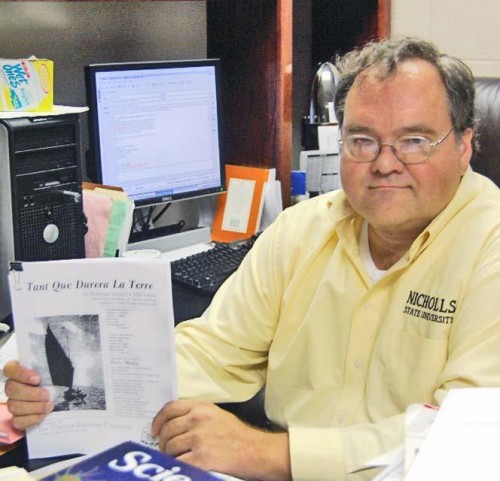Lafourche DA seeks death penalty in woman’s death
September 1, 2010
Officials tout public’s participation in recycling
September 3, 2010John Doucet was trapped, and despite his denials drowning in a sea of shouting and cheering, his career as a playwright was jump-started thanks to a man with lousy hearing in the overly crowded Cut Off Youth Center.
Doucet, who heads the honors program at Nicholls State University, read in the Lafourche Gazette in 1992 that a group was meeting to plan a festival for the centennial commemoration of the Hurricane of 1893. He decided to contribute by penning a brochure.
“I sat next to this man who’s a little hard of hearing and I said, ‘I want to write the brochure,'” Doucet said. “Little did I know, they had been talking for months about writing a play. He stood up and screamed, ‘He wants to write the play!’
“And everybody started screaming and yelling and clapping, and I couldn’t escape. I said, ‘No. No. No.’ I couldn’t escape because the door was blocked. I was stuck and I had to write a play.”
Despite never writing or even seeing a play, Doucet went to work on the script for “Tant que Durera la Terre” (“As Long as the Earth Lasts”), a show that would remember the destruction of a small fishing village on Cheniere Caminada.
While working on it, he was able to trace his own roots to his grandfather’s grandfather, who was a survivor of the hurricane on the peninsula.
“I did more research and I realized that [my grandparents’] ancestors actually survived the hurricane and everything fell into place,” Doucet said. “It was like the Saints winning the Super Bowl, it had to happen. Everything fell into place, so I was destined to write this play, I think. It was a great feeling. It was incredible. Total irony. Total coincidence.”
Eighteen years and 14 plays later, Doucet will once again celebrate the small fishing village on Cheniere Caminada on Saturday when the South Lafourche Library unveils permanent displays to preserve the history.
Windell Curole, who planned the 1993 Centennial festival, will also be at the unveiling to help place the display in its historical context.
“It’s going to be a cultural history type of setup, how things that came from Cheniere, the communities, how we became a little bit different from other areas,” Curole said. “We populated south Lafourche from the south when most of coastal Louisiana was populated from the north by people coming down the Mississippi River.”
Curole, like Doucet, is connected to Cheniere Caminada through lineage. His grandfather, born Feb. 1, 1893, was one of the few babies to survive the storm and he said his first memory is listening to his grandfather recount the family story about surviving the storm.
“He told me about the hurricane,” Curole said. “How they saw the tide got extremely high and that’s when they knew they were in trouble. That was the beginning. Many people through the years talked about that storm.”
The Centennial educated people about the culture of the peninsula in the late 19th century, but it also served as an applicable warning as to the dangers of hurricanes today, he said.
“Talking to people about their ancestors and some of their relatives dying, to this day, makes it more real that the risk that we live with in south La. and Coastal U.S,” Curole said.
“Times are different; it’s not 1965,” Doucet said. “There is no coast to protect us from the hurricanes.”
The presentation is Saturday at 1:30 p.m. at the Main Street library in Cut Off.
John Doucet holds a copy of his script to “Tant que Durera la Terre,” a play written for the 1993 Centennial festival celebrating the Hurricane of 1893. ERIC BESSON







